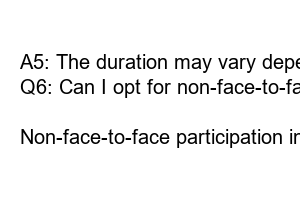주민등록 사실조사 비대면 참여
Title: Non-Face-to-Face Participation in Resident Registration Fact-Finding: Enhancing Efficiency and Convenience
Introduction:
In this fast-paced digital era, residents’ time is precious, and convenience is paramount. With non-face-to-face participation in resident registration fact-finding gaining popularity, people can now prioritize their commitments while fulfilling their civic responsibilities seamlessly. This blog post delves into the benefits and details of non-face-to-face participation, highlighting its efficiency and convenience when it comes to resident registration processes.
7 Subheadings:
1. What is Non-Face-to-Face Participation in Resident Registration Fact-Finding?
Non-face-to-face participation in resident registration is a convenient alternative that allows individuals to complete the process from the comfort of their homes or offices, eliminating the need for physical presence at registration centers.
2. How Does Non-Face-to-Face Participation Work?
With the help of advanced technology, non-face-to-face participation employs digital platforms and secure systems to collect necessary information remotely. Individuals can provide required documents electronically, reducing paperwork and streamlining the entire process.
3. The Advantages of Non-Face-to-Face Participation:
By adopting this method, individuals can save significant time and effort, as they are no longer required to make multiple trips to registration centers. The convenience factor enables greater flexibility, particularly for working professionals or those with limited mobility.
4. Ensuring Data Privacy and Security:
Non-face-to-face participation maintains high standards of data privacy and security with dedicated systems and encryption measures. Personal information is stored securely and confidentially, ensuring a reliable and trustworthy process.
5. Supporting Technological Infrastructure:
Governments and registration authorities continually enhance their technological infrastructure to provide a seamless experience. This includes user-friendly interfaces, easy-to-follow instructions, and accessible customer support channels.
6. Eligibility and Documentation Requirements:
To participate in the non-face-to-face registration process, individuals are typically required to meet specific eligibility criteria, such as having a valid identification document and proof of residency. These requirements can vary based on regional regulations.
7. Frequently Asked Questions (FAQs):
Q1: Is non-face-to-face participation available in all regions?
A1: Non-face-to-face participation availability may vary depending on local government regulations. It is recommended to check with your local registration authorities for information specific to your region.
Q2: Can I complete the entire registration process online?
A2: While the non-face-to-face participation option simplifies the process, some steps may still require physical presence, such as collecting certain documents or undergoing verification procedures.
Q3: Is the non-face-to-face participation process secure?
A3: Yes, registration authorities employ state-of-the-art security measures to protect personal information during the non-face-to-face participation process.
Q4: Can I update my registration information using non-face-to-face participation?
A4: Yes, many registration systems allow individuals to update their information using online platforms, ensuring convenience and ease of use.
Q5: How long does the non-face-to-face registration process take?
A5: The duration may vary depending on the volume of registrations and verification requirements. However, non-face-to-face participation aims to expedite the process and reduce wait times.
Q6: Can I opt for non-face-to-face participation if I am not tech-savvy?
A6: Yes, most platforms are designed with user-friendliness in mind, offering clear instructions and assistance throughout the process. Additionally, many registration authorities provide customer support channels to address any concerns or difficulties faced during the registration.
Summary:
Non-face-to-face participation in resident registration fact-finding revolutionizes the way individuals engage with their civic responsibilities. With improved convenience, time-saving benefits, and robust data security measures, this digital alternative offers a seamless experience. By leveraging advanced technology and streamlined processes, governments continue to enhance registration systems, making resident registration a hassle-free and efficient process for all.

